
Israeli Prime Minister Benjamin Netanyahu visited the United States on April 7 for the second time since President Donald Trump took office.
As Americans look at the Middle East, fewer say the Israel-Hamas war is important to them personally – or important to U.S. national interests – than felt that way early last year, according to a new Pew Research Center survey.
In addition, the public’s views of Israel have turned more negative over the past three years. More than half of U.S. adults (53%) now express an unfavorable opinion of Israel, up from 42% in March 2022 – before the Hamas attack of Oct. 7, 2023, and the ensuing Israeli invasion of the Gaza Strip. (Pew Research Center regularly asks about attitudes toward countries like Russia, the U.S., China and others. Refer to the “How we did this” box for more details.)
Americans’ confidence in Israeli Prime Minister Benjamin Netanyahu also remains relatively low (32%), according to the new survey. The survey was conducted March 24-30 – just before Netanyahu’s most recent visit – among a nationally representative sample of 3,605 U.S. adults.
In this analysis, we’ll look more closely at:
- How important Americans say the Israel-Hamas war is to them personally
- How important Americans say the Israel-Hamas war is to U.S. national interests
- Views of how Trump is handling relations with Israelis and Palestinians
- Views of Israel
- Views of Netanyahu
- Views of whether Israel and a Palestinian state can peacefully coexist
- Views of whether the U.S. should pursue taking control of the Gaza Strip
How important Americans say the Israel-Hamas war is to them personally
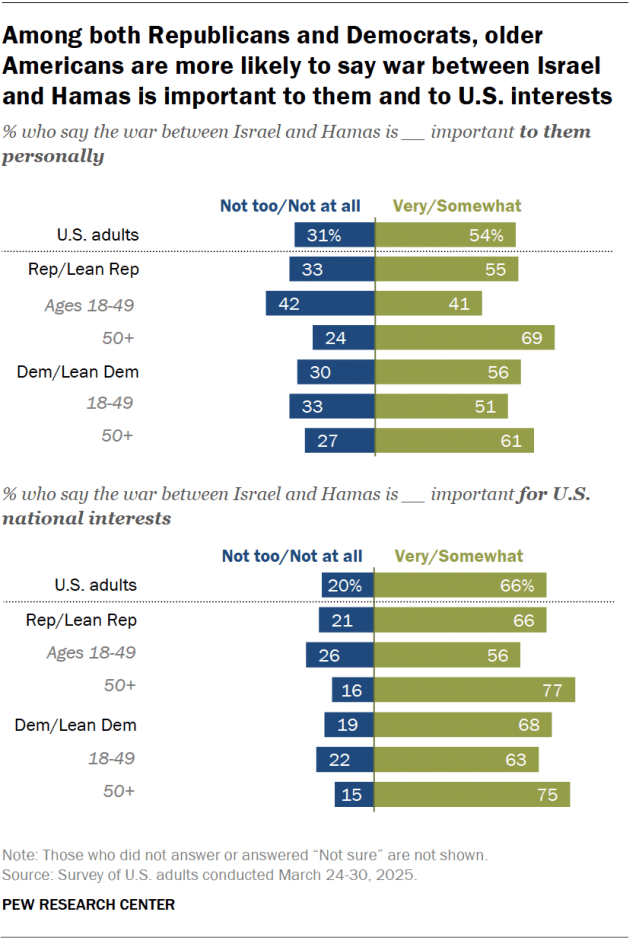
A slight majority of Americans (54%) say the Israel-Hamas war is either very or somewhat important to them personally. This is down from 65% who said the same in January 2024, a few months after the Hamas attack of Oct. 7, 2023.
Republicans and Democrats are about equally likely to describe the conflict as personally important. (In this analysis, all references to Republicans and Democrats include independents who lean toward each party.)
In both parties, people ages 50 and older are more likely than younger adults to say the conflict is important to them personally. But among Republicans, the gap between older and younger adults (18 percentage points) is wider than it is among Democrats (10 points). Younger Republicans are also considerably more likely than older Republicans to say they are not sure whether the war is important to them personally (17% and 7%, respectively).
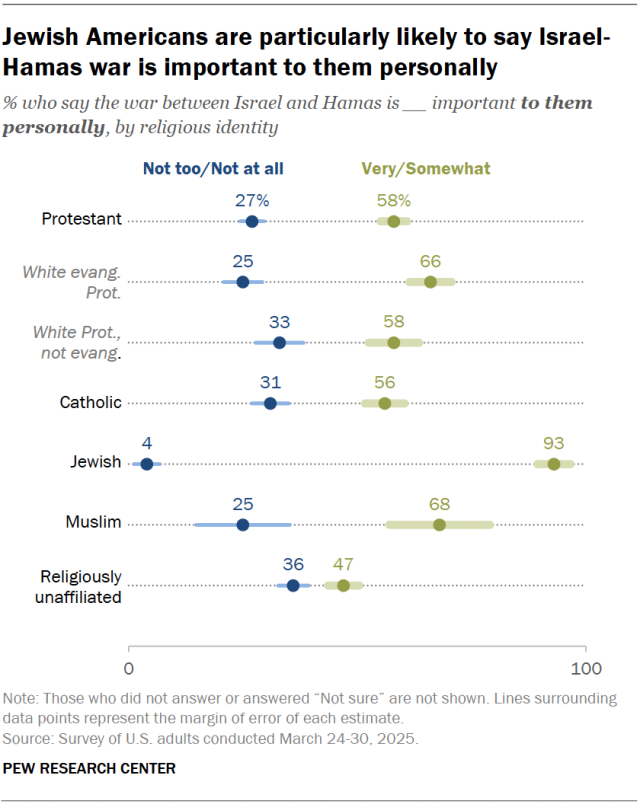
Jewish Americans are particularly likely to say the conflict is important to them personally, with 93% saying this, including 74% who consider it very important.
Large shares of Muslims (68%) and White evangelical Protestants (66%) say the conflict is either very or somewhat important to them personally. Smaller shares of Catholics (56%) and religiously unaffiliated adults (47%) also say they feel this way.
How important Americans say the Israel-Hamas war is to U.S. national interests
When asked how important the Israel-Hamas war is for America’s national interests, similar patterns emerge:
- 66% of U.S. adults say the war is either very or somewhat important for U.S. national interests, down 9 points since last year.
- Republicans and Democrats are about equally likely to say the war is important for U.S. interests.
- Older Americans are generally more likely than younger adults to view the conflict as important to national interests.
Majorities in most religious groups large enough to analyze describe the conflict as important for America’s interests, including 92% of Jewish Americans, 75% of White evangelical Christians and 66% of Muslim Americans.
Views of how Trump is handling relations with Israelis and Palestinians
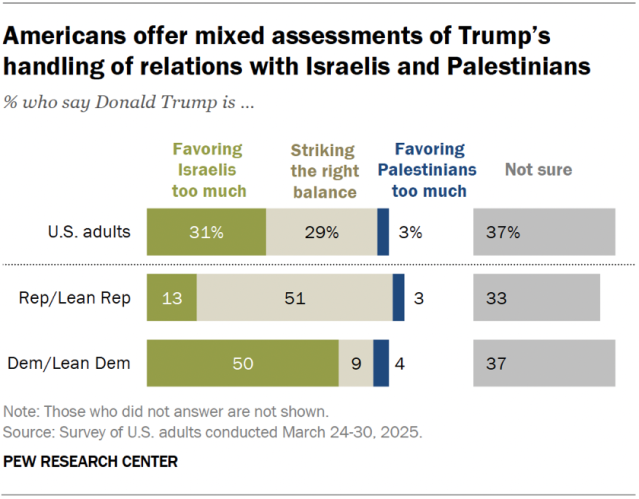
Americans are about evenly divided over whether Trump is favoring the Israelis too much (31%) or striking the right balance between Israelis and Palestinians (29%). Only 3% say Trump is favoring the Palestinians too much, while another 37% are unsure. (For more, read “Americans Give Early Trump Foreign Policy Actions Mixed or Negative Reviews.”)
Jewish Americans are also divided on this question: 36% say Trump is favoring Israelis too much, while 43% say he’s striking about the right balance. Just 2% say he is favoring Palestinians too much. Another 17% are unsure. By comparison, in February 2024, when we asked about former President Joe Biden’s approach, Jewish adults were less likely to say Biden was favoring Israelis too much (13% vs. 36% for Trump) and more likely to say he was favoring Palestinians too much (18% vs. 2% for Trump). Jewish Americans were about as likely to say Biden was striking the right balance as they are to say that about Trump (45% vs. 43%).
Seven-in-ten Muslim Americans say Trump is favoring Israelis too much, largely unchanged from the share who said Biden was favoring Israelis too much last February.
Views of Israel
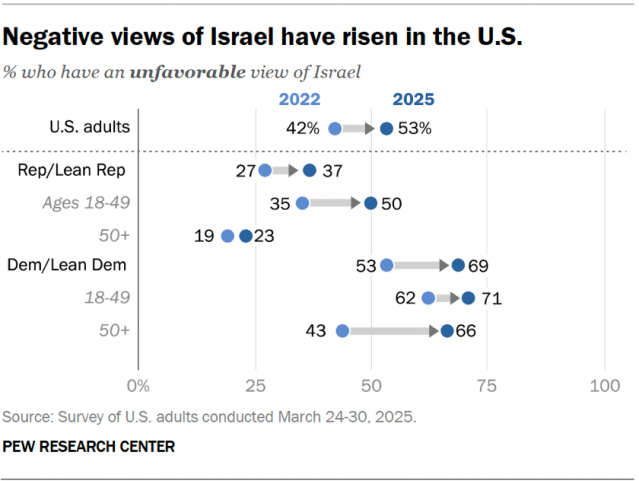
A slight majority of Americans (53%) now express a somewhat or very unfavorable opinion of Israel. This marks an 11-point increase in unfavorable views since March 2022, when we last asked this question. The share of U.S. adults who voice very unfavorable views of Israel has roughly doubled over this period, from 10% in 2022 to 19% in 2025.
Democrats are much more likely to express unfavorable opinions of Israel than Republicans (69% vs. 37%). In 2022, 53% of Democrats and 27% of Republicans had negative views of Israel.
Younger and older Democrats alike have turned more negative toward Israel over this three-year period, but negative views among younger Democrats have grown by 9 points, compared with a 23-point increase among older Democrats.
Among Republicans, much of the shift in attitudes has come among younger adults. Republicans under 50 are now about as likely to have a negative view of Israel as a positive one (50% vs. 48%). In 2022, they were much more likely to see Israel positively than negatively (63% vs. 35%).
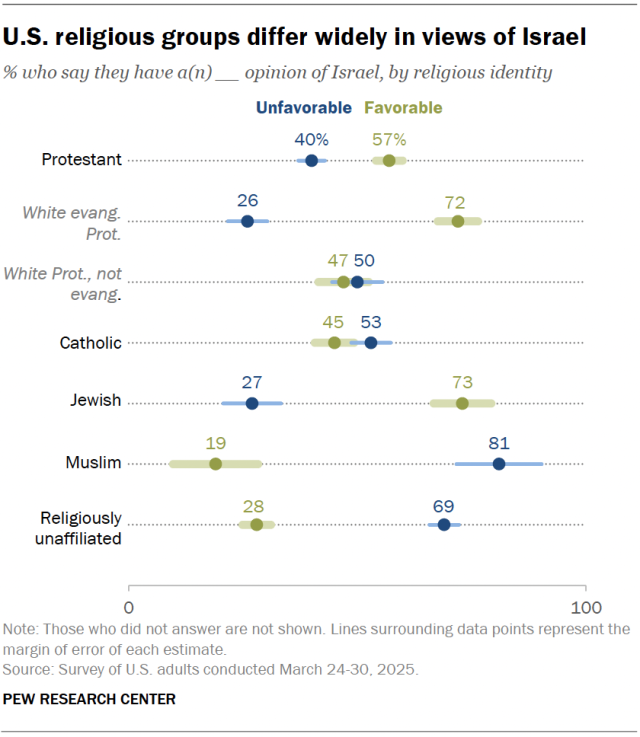
Views of Israel also differ substantially among the U.S. religious groups that are large enough to analyze.
Muslims and the religiously unaffiliated – those who say they are atheist, agnostic or “nothing in particular” – have particularly negative views of Israel (81% and 69% unfavorable).
White nonevangelical Protestants are about evenly divided in their opinions (50% unfavorable, 47% favorable).
Jewish Americans and White evangelical Protestants have mostly positive views of Israel. Around seven-in-ten in each group express a favorable opinion, including 42% of Jews and 36% of White evangelicals who express a very favorable opinion.
From 2024: Views of Israelis and Palestinians, the Israeli government, the Palestinian Authority and Hamas
Views of Netanyahu
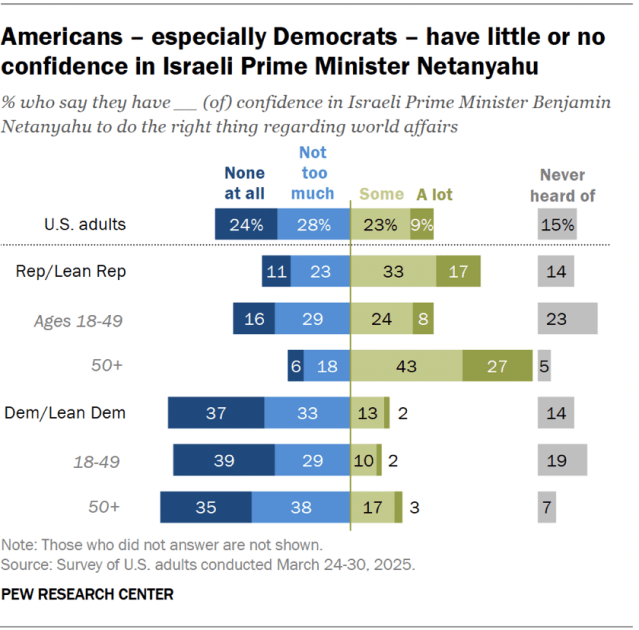
According to the survey, which was conducted just prior to Israeli Prime Minister Benjamin Netanyahu’s most recent visit, a slim majority of Americans (52%) have little or no confidence in Netanyahu to “do the right thing regarding world affairs,” while 32% voice confidence in him. This is largely unchanged since last year, though the share of Americans with little or no confidence in Netanyahu rose significantly between 2023 and 2024.
Republicans are significantly more upbeat about the Israeli leader’s handling of global affairs than Democrats are (51% confident vs. 15%). Older Republicans are especially positive: Those ages 50 and older are about twice as likely as those under 50 to have confidence in Netanyahu (70% vs. 32%).
Among Democrats, majorities of both younger and older adults lack confidence in Israel’s prime minister. (In both parties, younger people are less likely than older people to have heard of Netanyahu.)
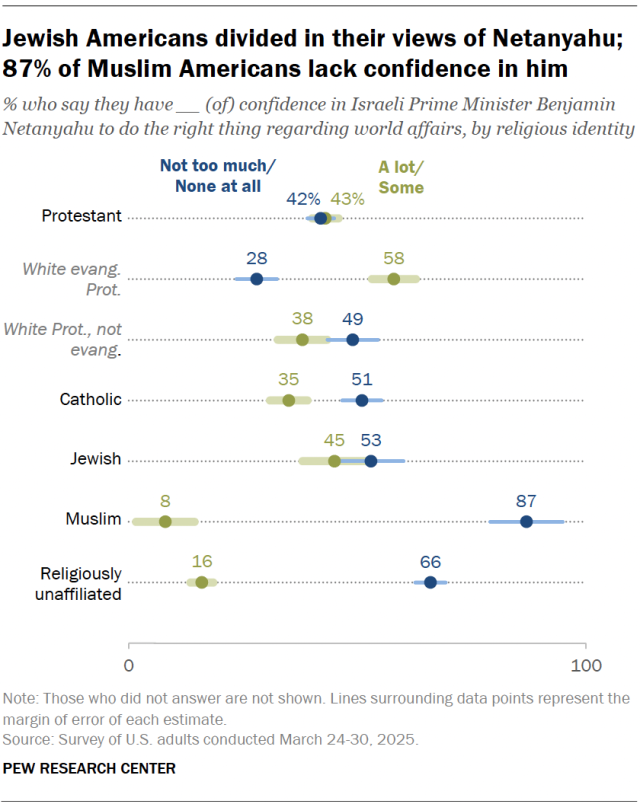
More than half of White evangelical Protestants say they are confident in Netanyahu’s handling of world affairs (58%).
In most of the other religious groups that are large enough to analyze, views are more divided or broadly negative. For example, 53% of Jewish Americans lack confidence in Netanyahu’s leadership, while 45% have confidence. And among Muslim Americans, 87% have little or no confidence in him – including 74% who have no confidence at all.
Views of whether Israel and a Palestinian state can peacefully coexist
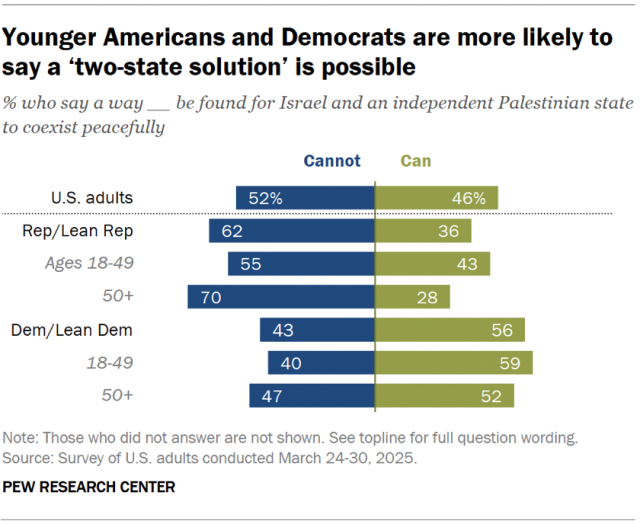
Fewer than half of Americans (46%) now think a way can be found for Israel and an independent Palestinian state to coexist peacefully with each other – an arrangement often called a “two-state solution.” This is down from 52% who said this in a late 2023 survey.
Today, Democrats are much more likely than Republicans (56% vs. 36%) to see the possibility of peaceful coexistence between Israel and a Palestinian state.
Younger Americans are also more likely than older ones to say that peaceful coexistence between the two sides can be found.
Views about a two-state solution are fairly divided among Jewish Americans and Muslim Americans alike. About half of Jews (47%) say it’s possible, while 52% say it is not. Among Muslims, 56% say it is possible and 43% disagree.
Views of whether the U.S. should pursue taking control of the Gaza Strip
Trump has said that the United States should take over the Gaza Strip. In our new survey, 38% of Americans do not think it is likely the president will pursue this policy.
The idea is also broadly unpopular: 62% of Americans oppose the U.S. taking over Gaza – including 49% who strongly oppose it – while 15% favor Trump’s proposal and 22% say they aren’t sure.
Jewish Americans are slightly more in favor of the proposal than most other religious groups that are large enough to analyze. Among Jewish adults, 32% say they favor Trump’s idea and 64% oppose it. (Jewish Americans are less likely than most other U.S. religious groups to say they are unsure about this.)
Note: Here are the questions used for this analysis, the topline and the survey methodology.
